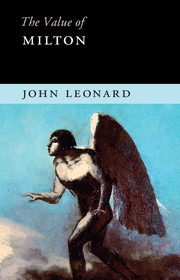Book contents
- Frontmatter
- Dedication
- Contents
- Preface
- Textual note
- 1 Areopagitica, toleration and free speech
- 2 The minor poems and ‘the power / to save’
- 3 The political prose: ‘in liberty's defence’
- 4 Paradise Lost, the sublime poem
- 5 Paradise Lost, ‘solid good’
- 6 Paradise Regained, ‘To the utmost of mere man’
- 7 Samson Agonistes, tragedy and terror
- Notes
- Index
1 - Areopagitica, toleration and free speech
Published online by Cambridge University Press: 05 July 2016
- Frontmatter
- Dedication
- Contents
- Preface
- Textual note
- 1 Areopagitica, toleration and free speech
- 2 The minor poems and ‘the power / to save’
- 3 The political prose: ‘in liberty's defence’
- 4 Paradise Lost, the sublime poem
- 5 Paradise Lost, ‘solid good’
- 6 Paradise Regained, ‘To the utmost of mere man’
- 7 Samson Agonistes, tragedy and terror
- Notes
- Index
Summary
I begin this book with Areopagitica because it speaks to our current concerns about free speech. It speaks directly, but not always clearly. The subtitle, A Speech of Mr. John Milton for the Liberty of Unlicensed Printing, sounds clear, but opinion differs as to how far Milton's ‘liberty’ extends. The traditional view is that Areopagitica is one of the founding texts of modern liberalism. A rival view holds that it is illiberal and intolerant. A third view, also iconoclastic, but not hostile, values Areopagitica because it limits freedom. Stanley Fish takes the latter line in his provocatively titled book There's No Such Thing as Free Speech: And It's a Good Thing, Too. The argument is therefore triangular. The disagreement is not just between those who praise Milton for being tolerant and those who chide him for being intolerant. Some have praised him for being intolerant. The triangular shape of the debate makes Areopagitica especially relevant to our own time. Before the collapse of the Soviet Union, Western democracies felt a need at least to pretend to value free speech, but for the past three decades ‘speech codes’ and other prohibitive initiatives have proliferated. Areopagitica has never been more relevant than it is today.
Despite critics’ disagreements as to the substance of Milton's argument, its basic shape is clear. It is quadripartite. The first part is historical in method and is intended to embarrass Parliament by demonstrating that licensing was invented by the Church of Rome, an origin ‘ye will be loath to own’. Commentators are divided as to the accuracy of Milton's history. My concern is his value today, so I shall concentrate on the other three arguments. The second is a disquisition on ‘what is to be thought in general of reading, whatever sort the books be’ (491). In this section Milton claims that wise readers can put bad books to good use. He even goes so far as to argue that we need bad books. The third argument is practical. Milton claims that licensing ‘avails nothing’ (491), since evil will always get through. The fourth and final argument claims that censorship leads to ‘the discouragement of all learning’ (492). This argument sets the pattern for all subsequent defences of what we would now call ‘academic freedom’, though Milton's concerns are not just academic.
- Type
- Chapter
- Information
- The Value of Milton , pp. 1 - 21Publisher: Cambridge University PressPrint publication year: 2016

